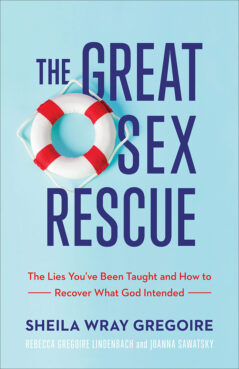(RNS) — Evangelicals are pointing fingers at “celebrity Christian culture,” blaming it for the tragic Ravi Zacharias sexual abuse and rape scandal and the extramarital escapades of Hillsong pastor Carl Lentz (as well as so many more). But what if this epidemic is not just — or even mostly — caused by celebrity culture?
What if it’s the evangelical view of sex?
Yes, celebrity culture gave Zacharias more access to victims and gave both men cover for what they were doing. But it was not celebrity culture that taught these men to objectify women. Our evangelical culture primed them for it.
Take the best-selling Every Man’s Battle series of books. “Every Heart Restored” says: “Because of male hardwiring, men don’t naturally have that Christian view of sex.” “Every Man’s Battle” says: “We find another reason for the prevalence of sexual sin among men. We got there naturally — simply by being male.”
RELATED: Ministry leaders’ rush to empathize with Ravi Zacharias is beyond alarming
Repeatedly, God-given male sexuality and objectification of women are seen as one and the same. Tim LaHaye, in “The Act of Marriage,” echoes this: “Women must cultivate the problem of visual lust, whereas men almost universally must cope with the problem just because they are men.”
So if men can’t help it, what do these books propose is the solution?
Women! It is women who keep men from sinning. And it starts with understanding this is just how men are.
“For Women Only” quotes a man wishing his wife could “accept the struggle I have with lust,” and he could “reveal my weaknesses without being judged or accused,” saying he wants to be “loved for who I am, not for who she wants me to be.” In response to the husband’s quote, the book asks, “Do we want to support our husbands, or to change them?”
“Love & Respect” says: “If your husband feels you do not respect his struggle, his desire for you, and his maleness, he’ll pull back from you.”
In one of the most degrading choices of words ever made, “Every Man’s Battle” tells women: “Once he tells you he’s (quitting lust) cold turkey, be like a merciful vial of methadone for him.” Proving the metaphor was deliberate, the authors repeat it: “Your wife can be a methadone-like fix when your temperature is rising.” No talk of intimacy or dignity; she is simply a “methadone-like fix.”

In this May 29, 2020, file photo, images of Ravi Zacharias are displayed in the Passion City Church during a memorial service for him in Atlanta. A posthumous sex scandal involving Zacharias, who founded the Ravi Zacharias International Ministries, has placed the global organization in a wrenching predicament. (AP Photo/Brynn Anderson, File)
Since male sexuality hinges on objectification of women, the best couples can hope for, apparently, is that he objectifies only one woman: the one he married. By getting his fill with his sanctioned option, he can withstand the more alluring ones.
Husbands don’t stop needing methadone when wives are physically unwell, either. In “Sheet Music,” Kevin Leman says that if a wife is bleeding heavily, recovering from childbirth or “simply not feeling her best,” she can help her husband out with a “hand job” if he’s “ready to climb the walls.” After talking about how difficult the wife’s period is on a husband trying to resist pornography, he adds oral sex to the mix, telling women, “faithfulness is a two-person job.”
Elsewhere, Leman also warns ominously: “Either you will have a love affair with your husband or somebody else will.” Emerson Eggerichs, in “Love & Respect,” writes from the same playbook: “The cold, hard truth is that men are often lured into affairs because they are sexually deprived at home.”
RELATED: Ravi Zacharias posthumously defrocked, ministry suspends fundraising after abuse report
And if women rightfully get upset by these threats? The authors gaslight their female readers, emphasizing husbands have needs they, as women, will never understand. “Love & Respect” says it straight, “If your husband is typical, he has a need you don’t have.”
“The Power of a Praying Wife” says: “(F)or a husband, sex is pure need. His eyes, ears, brain and emotions get clouded if he doesn’t have that release.”
These books add warnings of God’s condemnation, too, if wives deprive their husbands. “Sheet Music” warns, “If you call yourself a Christian, and if you’re committed to being obedient to what the Bible teaches, then you’ll have to learn to fulfill sexual obligations within marriage.”
“Love & Respect” takes it a step further with spiritual fear tactics: “Husbands, particularly, can come under satanic attack when deprived of sexual release.”

“The Great Sex Rescue” Courtesy image
But who is actually being deprived of sexual release? In surveys I conducted with two researchers for our upcoming book “The Great Sex Rescue,” we found a 43-point orgasm gap in men’s favor (92% of men almost always or always reach orgasm in a sexual encounter; only 49% of women do). It seems that in the average evangelical marriage, it’s more likely to be the woman who is deprived — and it’s the men who are not fulfilling their sexual obligations to their wives.
Nevertheless, throughout our evangelical bestsellers, the message to women comes through as loud as a bullhorn: His need for sex is bigger than your need for anything else. And when women don’t put out? Men apparently become predators.
“The Act of Marriage” describes a husband who raped his wife while she was “kicking and screaming” on their wedding night as “equally unhappy” as his rape victim. “His Needs, Her Needs” says, “He is pawing and grabbing because he needs something — very badly. … As one thirty-two-year-old executive put it, ‘I feel like a fool — like I’m begging her or even raping her.’”
“Every Heart Restored” recounts a woman saying, “Without foreplay, he raped me — if that can happen when you’re married.” But then the authors fail to clarify that, yes, rape is rape, even in marriage.
“Every Man’s Battle” presents masturbating in gym parking lots or to the sight of one’s sister-in-law sleeping as normal male behavior. In the same book, a youth group volunteer who was married with three kids rapes a 15-year-old girl and is portrayed sympathetically, since his lust overwhelmed him.
When abuse scandals like Ravi Zacharias or sex scandals like Carl Lentz are exposed, we should stop being surprised. These men acted out exactly what so many evangelical resources taught them: Men need physical release; they can’t control themselves without women’s help; if they don’t get help, they could easily become predators. And this is all presented as God’s design.

In this Oct. 23, 2017, file photo, Carl Lentz, a pastor who ministered to thousands at his Hillsong Church in New York, appears during an interview, in New York. (AP Photo/Bebeto Matthews)
Of course, the secular world has its scandals, too, and lust was not invented by evangelicals. But in academia, government, business and journalism, the rhetoric promotes empowering and respecting women. In evangelicalism, the rhetoric in our bestsellers promotes women as methadone. Yes, Harvey Weinsteins and Jeffrey Epsteins still proliferate, and we’ll likely always have frat boys leering at women on the street. But those frat boys will hear in their college classes and later in their human resource meetings that objectification is wrong. In their churches and at their men’s ministry retreats, though, they will be told objectification is just a natural, unavoidable part of being male.
RELATED: Beyond $1,000 sneakers: Carl Lentz, hype priests and the cult of celebrity
Too many of our resources have stolen dignity from women while demeaning men and denying men’s sanctification, and the result has been abysmal.
For our new book, “The Great Sex Rescue,” we surveyed 20,000 predominantly Christian women to see the effects of evangelical teachings about sex on their sexual satisfaction, marital satisfaction and rates of sexual pain — and the results were eye-opening.
We found that messages like “all men struggle with lust; it’s every man’s battle”; “a wife is obligated to give her husband sex when he wants it”; “women should have frequent sex with their husbands to keep them from watching porn”; and “boys will want to push girls’ sexual boundaries” are all widely taught and widely believed.
And that’s grievous, because we also found these beliefs are correlated with lowering women’s orgasm rates, their ability to get aroused, their trust in their husbands and their marital satisfaction — and even increasing the incidence of sexual pain. Jesus told us to look at the fruit to judge the tree, and the fruit of this tree is nasty.
We want to call the evangelical church to something higher, something better, something more centered on the person and character of Jesus. Until we start talking about a Jesus-centered sexual ethic, rooted in mutuality and intimacy, we will continue to have these scandals on our front pages, because they’re reflecting what’s happening in our bedrooms.
In the Old Testament, we read the heartbreaking story of Hagar. Used sexually by her master to bear a child, and then discarded when she becomes a liability, she is forced out into the desert with her son. God meets her there. And then she is given the honor of being the first one in Scripture to bestow a name upon God: “the God who sees me.”

Sheila Wray Gregoire. Photo by Dawn Stafford
Whether a woman is alone in a desert, by a well in a Samaritan village or weeping while checking her husband’s browser history, God sees her. When will evangelicalism do the same?
This article has been corrected to reflect that quotes taken from the book “For Women Only” were references to a quote by a man included in the book.
(Sheila Wray Gregoire is an award-winning author and marriage and sex blogger at ToLoveHonorandVacuum.com. Her new book, “The Great Sex Rescue,” written with Rebecca Lindenbach and Joanna Sawatsky, launches March 2. The views expressed in this commentary do not necessarily reflect those of Religion News Service.)





